The First 7 Questions I Ask When Evaluating a Small Group Ministry
 I get a steady stream of emails asking for help with small group ministries. I also find myself sitting down with small group pastors and senior pastors when I'm at conferences (or when ministry teams stop in to see me in Vegas).
I get a steady stream of emails asking for help with small group ministries. I also find myself sitting down with small group pastors and senior pastors when I'm at conferences (or when ministry teams stop in to see me in Vegas).
It's fun and I love the opportunity to help. But I thought it might help you to know that I ask the same basic diagnostic questions in almost every case. Yes...there are exceptions and yes, the answers lead me to different follow up questions. But the set of first questions is such a pattern I thought it might help you to see what they are.
The First 7 Questions I Ask:
1. What is your church's average adult worship attendance?
Depending on your church's philosophy of ministry, you might need to back out children and students in worship, but this is an important number. Keep in mind it doesn't reflect the total number of adults who attend your church (that can estimated elsewhere), but it does give you a sense of how many are more connected.
2. What is your church's Easter or Christmas Eve adult attendance?
Again, this may take some thinking and it might require an intelligent guess. You need to know this number though, since it is a more accurate reflection of the number of adults who consider your church to be their church. Remember, as frequency of attendance decreases, special services (like Easter and Christmas Eve) are usually a better measure of the total number of adults who attend.
3. How many small groups do you currently have (and how many adults are in them)?
This is an important number but must be wisely defined. I'm only referring to small groups that meet certain criteria (i.e., they need to meet 2 to 4 times a month and they need to be integrating most of the basic ingredients of life-change). Using the right criteria will usually exclude some groups. That is important because the count is meaningless if you don't.
See also, What Percentage of Your Adults are Actually Connected? and What's Your Urgency Level for Connecting People?
4. How did the groups you currently have get started (and how old are they)?
This is important information. If you're not launching new groups on a regular basis, you're often falling for the temptation to add members to existing groups instead of prioritizing launching new groups. And unless you're prioritizing the identification of new leaders and the launch of new groups you're unlikely to build a thriving small group ministry.
See also, 5 Clues that Reveal Your Small Group Ministry's Best Next Step.
5. Is your senior pastor in a small group?
It is very hard to believably champion something in which you're not involved. Your pastor doesn't need to lead a group. They do need to be a member of a group.
See also, What Part Does Your Senior Pastor Play?
6. Is your senior pastor the small groups champion?
If you want to build a thriving small group ministry, there is no substitute or work-around for a senior pastor as small group champion.
See also, Your Senior Pastor as Small Group Champion Leads to a Church OF Groups.
7. Are small groups the way you connect and disciple adults? Or are small groups one of several options?
The answers to these questions actually reveal two very important understandings.
- First, how clearly have you defined this important next step? If you're offering multiple menu options you shouldn't be surprised when adults have difficulty choosing.
- Second, if you've designed (or allowed to exist) a strategy that makes discipleship an extra step you shouldn't be surprised when it begins to be defined as a step for spiritual super heroes and ninjas.
See also, Small Group Ministry Roadblock #2: A Bloated Belong and Become Menu.
Albert Einstein said, If I had an hour to solve a problem I'd spend 55 minutes thinking about the problem and 5 minutes thinking about solutions. I say, ask the right questions and you'll end up identifying the critical issues keeping your ministry from thriving.
Albert Einstein said, If I had an hour to solve a problem I'd spend 55 minutes thinking about the problem and 5 minutes thinking about solutions. I say, ask the right questions and you'll end up identifying the critical issues keeping… Share on X
Need help?
How to Diagnose Your Small Group Ministry is a 4 session mini-course that will teach you how to do what I do when I'm hired as a consultant to help churches build a thriving small group ministry.



Great list of questions. Back in the dark ages when I pastored, small groups were central to our ministry. At first I led one but eventually was able to be “a part of one”. Totally agree, ” hard to believably champion something in which you’re not involved.”
Thanks Mike! You are absolutely right. No one really buys that something is important unless it is important to you!
mark